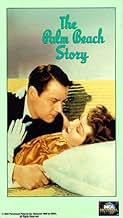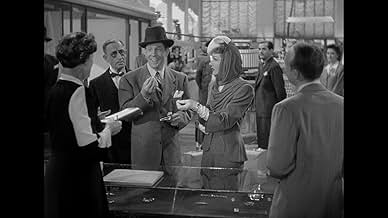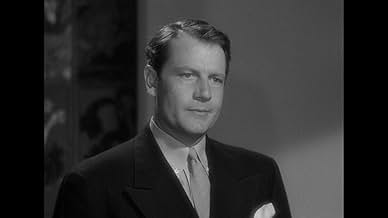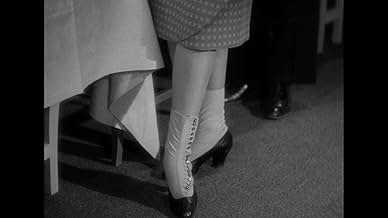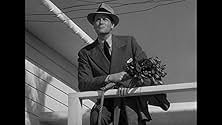ÉVALUATION IMDb
7,4/10
13 k
MA NOTE
Un inventeur a besoin d'argent pour développer sa grande idée, alors sa femme adorante décide de l'élever en divorçant et en épousant un millionnaire.Un inventeur a besoin d'argent pour développer sa grande idée, alors sa femme adorante décide de l'élever en divorçant et en épousant un millionnaire.Un inventeur a besoin d'argent pour développer sa grande idée, alors sa femme adorante décide de l'élever en divorçant et en épousant un millionnaire.
- Director
- Writers
- Stars
- Prix
- 1 victoire au total
Roscoe Ates
- Fourth Member Ale and Quail Club
- (as Rosco Ates)
Avis en vedette
Fun fun!! the versatile Claudette Colbert is Gerry, married to an architect Tom (Joel Mcrea), who can't get his designs across. so... Gerry hatches a ridiculous plot to leave him, and get hitched to someone who CAN help him. right from the start, we know its going to be silly and fun, with the william tell overture. Supporting cast is filled with incredible hollywood names (how did they ever get all of them together?) Mary Astor, Rudy Vallee, William Demarest, Franklin Pangborn. and some funny scenes, like the old,deaf guy that wants to rent Gerry's apartment while she's still in it, or the group of drunks on the train. all classic Sturges... loud, over the top scenes. it all moves right along, with a snappy script and story. Vallee is the rich guy who may or may not come to Gerry's rescue. and that surprise ending... where did that come from? but it's fun. a lot of fun. definitely worth catching this one! Written and directed by Preston Sturges. one of only fourteen films he directed. all clever and fun.
When commenting on a film as brilliantly constructed and deeply entertaining as The Palm Beach Story, it's hard to know just where to start.
Do you tip your hat to the uniformly wonderful performers?
Do you pay tribute to the bizarre and hilarious conversations held by the Weenie King (Robert Dudley), an incidental character who manages to be a lot more than a mere plot contrivance?
Do you mention the fact that the film was clearly an influence upon the (slightly superior) screwball classic Some Like It Hot?
Nope. You just say, Preston Sturges was a genius and this is his best film.
Gerry Jeffers (Claudette Colbert) has decided that she needs to divorce her husband Tom (Sturges regular Joel McCrea). Why? We're not quite sure. Perhaps she's looking for thrills, perhaps she simply wants a partner who can pay the rent and perhaps she's truly come to believe that she no longer loves him. No matter. Her mind is made up and there's nothing Tom can do about it. Try as he might, Gerry slips through his fingers and ends up on a train to Palm Beach, the divorce capital of the world.
Echoes of Some Like first appear on the train ride when Gerry finds herself unable to sleep do to the racket being caused by The Ale and Quail Club. It's bad enough when they start shooting out windows, and what comes next... let's just say that it's a lot funnier than it would be if it happened in real life.
Still, Gerry makes it to Palm Beach, in the company of nutty millionaire John D. Hackensacker (Rudy Vallee). Things only get really out of hand once Tom arrives and becomes pegged as a bachelor, Captain McGlew. And spoil more of the plot for you I will not.
Sturges was capable of operating in many modes: responsible and patriotic (Sullivan's Travels) and outrageously madcap (The Miracle of Morgan's Creek) are two that come to mind. But Palm Beach shares its elegance, wit and reserve with The Lady Eve, in which con artist Barbara Stanwyck sets her sights on absent-minded professor Henry Fonda. (Even the mistaken identity plot is similar upon examination).
Between the two, Eve may end on a slightly more graceful note, but Beach seems to be made with a bit more... well, experience. Sturges seems at his most relaxed throughout the film and it does a world of good. (The story is bogged down only by brief moments of racism early on). And leaving, it's hard not to feel sunny and refreshed.
For those in need of a vacation, I recommend a stay at Palm Beach. And the rest of you should come along as well.
Do you tip your hat to the uniformly wonderful performers?
Do you pay tribute to the bizarre and hilarious conversations held by the Weenie King (Robert Dudley), an incidental character who manages to be a lot more than a mere plot contrivance?
Do you mention the fact that the film was clearly an influence upon the (slightly superior) screwball classic Some Like It Hot?
Nope. You just say, Preston Sturges was a genius and this is his best film.
Gerry Jeffers (Claudette Colbert) has decided that she needs to divorce her husband Tom (Sturges regular Joel McCrea). Why? We're not quite sure. Perhaps she's looking for thrills, perhaps she simply wants a partner who can pay the rent and perhaps she's truly come to believe that she no longer loves him. No matter. Her mind is made up and there's nothing Tom can do about it. Try as he might, Gerry slips through his fingers and ends up on a train to Palm Beach, the divorce capital of the world.
Echoes of Some Like first appear on the train ride when Gerry finds herself unable to sleep do to the racket being caused by The Ale and Quail Club. It's bad enough when they start shooting out windows, and what comes next... let's just say that it's a lot funnier than it would be if it happened in real life.
Still, Gerry makes it to Palm Beach, in the company of nutty millionaire John D. Hackensacker (Rudy Vallee). Things only get really out of hand once Tom arrives and becomes pegged as a bachelor, Captain McGlew. And spoil more of the plot for you I will not.
Sturges was capable of operating in many modes: responsible and patriotic (Sullivan's Travels) and outrageously madcap (The Miracle of Morgan's Creek) are two that come to mind. But Palm Beach shares its elegance, wit and reserve with The Lady Eve, in which con artist Barbara Stanwyck sets her sights on absent-minded professor Henry Fonda. (Even the mistaken identity plot is similar upon examination).
Between the two, Eve may end on a slightly more graceful note, but Beach seems to be made with a bit more... well, experience. Sturges seems at his most relaxed throughout the film and it does a world of good. (The story is bogged down only by brief moments of racism early on). And leaving, it's hard not to feel sunny and refreshed.
For those in need of a vacation, I recommend a stay at Palm Beach. And the rest of you should come along as well.
Claudette Colbert is a knockout who knows it. She wants the good life, which her inventor husband can't give her. So she leaves him, intending on marrying someone who can support her and finance his invention. Things don't quite work out.
The opening of "Palm Beach Story" is a bizarre scene that only makes some sense (and I'm emphasizing some) at the very end of the film. It's certainly an original way to start a movie. There are some hilarious scenes in this film - desperate to get to Palm Beach for a quickie divorce, but with no money, Colbert accepts the invitation of the gentlemanly Ale and Quail Club to ride in their private train car as their guest and mascot. Unfortunately, the emphasis in this club is the ale and not the quail - shooting sugar cubes will do - also blowing out train windows, trashing whole train cars - you get the idea. Running from them, Colbert soon meets up with Rudy Vallee, who gives an absolutely delightful performance as a filthy rich man. He serenades her at one point, and it's great, hearkening back to his days as a crooner! Mary Astor is his many times married sister, and when Colbert's husband shows, in the form of Joel McCrea, Astor sees her next mark.
McCrea has a funny slapstick fall down a flight of stairs, but otherwise, doesn't have much to do except be angry and jealous of his wife. Colbert in her glorious clothes, Vallee, and a vivacious Astor upstage him a bit. A very funny film, produced during World War II to give America a much-needed laugh.
The opening of "Palm Beach Story" is a bizarre scene that only makes some sense (and I'm emphasizing some) at the very end of the film. It's certainly an original way to start a movie. There are some hilarious scenes in this film - desperate to get to Palm Beach for a quickie divorce, but with no money, Colbert accepts the invitation of the gentlemanly Ale and Quail Club to ride in their private train car as their guest and mascot. Unfortunately, the emphasis in this club is the ale and not the quail - shooting sugar cubes will do - also blowing out train windows, trashing whole train cars - you get the idea. Running from them, Colbert soon meets up with Rudy Vallee, who gives an absolutely delightful performance as a filthy rich man. He serenades her at one point, and it's great, hearkening back to his days as a crooner! Mary Astor is his many times married sister, and when Colbert's husband shows, in the form of Joel McCrea, Astor sees her next mark.
McCrea has a funny slapstick fall down a flight of stairs, but otherwise, doesn't have much to do except be angry and jealous of his wife. Colbert in her glorious clothes, Vallee, and a vivacious Astor upstage him a bit. A very funny film, produced during World War II to give America a much-needed laugh.
One element of this film that shouldn't be ignored is that it, like "Sullivan's Travels" and "The Miracle of Morgan's Creek," is a conscious lampooning of earlier movies from the 1930s. It takes a standard, conventional plot from those movies and turns it on its ear. The same plot can be seen for example in the Paramount movie from 1931, "Up Pops the Devil," with Carole Lombard and Norman Foster (who coincidentally was Claudette Colbert's first husband). In that movie, a wife who still loves her husband wants to divorce him for his own good; she thinks she's just a noose around his neck, and once rid of her, he'll become a success. It's set in the same upper crust of society as "The Palm Beach Story," with a millionaire suitor for the wife and a nymphomaniac girl for the husband. Here, everything is played straight, with as much pathos and melodrama being milked out of the situation as can be. In "The Palm Beach Story" though, the same basic plot and characters are used, but it's the comedic potential and wackiness of the situation that's emphasized, to marvelous effect.
The subplot with the twins, glanced at in the beginning and end of the picture, is another conscious lampooning of conventional movies, here a lampooning of the structure of movies themselves, of their conventional beginnings and endings. It's not meant to be taken seriously; as McCrea's character casually says at the end, it's all stuff "for another movie."
No words can be found to adequately praise Claudette Colbert's performance. Joel McCrea is good too, as the prototypical wooden 1930s leading man. Rudy Vallee is absolutely hilarious as a "momma's boy" version of John D. Rockefeller, as is Mary Astor as his rich nymphomaniac sister. Her eunuch, Toto, played by Sig Arno, seems straight out of an Ernst Lubitch picture, perhaps a Sturges nod to the master. Quite a few scenes of the film, in their settings and atmosphere, pay homage to Lubitsch. Sturges does the "Lubitsch touch" proud, especially in those two scenes when Colbert sits on McCrea's lap so that he can undo the back of her dress, with the two of them both times melting into a kiss, and the scene ending with a fade out, leaving little doubt as to what will happen next. The second scene is particularly romantic, done as Rudy Vallee sings "Good Night Sweet Heart," itself a standard of the 1930s. Vallee also sings a line of "Isn't It Romantic," a song introduced in the luminous 1932 film "Love Me Tonight," directed by Rouben Mamoulian. The music in the film itself hearkens back to those great romantic comedies of the 1930s.
It's nice to see Sturges's stock company of actors popping up here as well. I noticed William Demarest say his name was "Bill Docker," the same name his character had in Preston Sturges's "Christmas in July."
In short, "The Palm Beach Story" is a wonderful film, whose richness can really be appreciated when seen in context, in the context of those old 1930s Paramount films, both the melodramatic ones like "Up Pops the Devil," that it lampoons, and the comedic, romantic ones like "Love Me Tonight" and "One Hour with You," that it pays homage to.
The subplot with the twins, glanced at in the beginning and end of the picture, is another conscious lampooning of conventional movies, here a lampooning of the structure of movies themselves, of their conventional beginnings and endings. It's not meant to be taken seriously; as McCrea's character casually says at the end, it's all stuff "for another movie."
No words can be found to adequately praise Claudette Colbert's performance. Joel McCrea is good too, as the prototypical wooden 1930s leading man. Rudy Vallee is absolutely hilarious as a "momma's boy" version of John D. Rockefeller, as is Mary Astor as his rich nymphomaniac sister. Her eunuch, Toto, played by Sig Arno, seems straight out of an Ernst Lubitch picture, perhaps a Sturges nod to the master. Quite a few scenes of the film, in their settings and atmosphere, pay homage to Lubitsch. Sturges does the "Lubitsch touch" proud, especially in those two scenes when Colbert sits on McCrea's lap so that he can undo the back of her dress, with the two of them both times melting into a kiss, and the scene ending with a fade out, leaving little doubt as to what will happen next. The second scene is particularly romantic, done as Rudy Vallee sings "Good Night Sweet Heart," itself a standard of the 1930s. Vallee also sings a line of "Isn't It Romantic," a song introduced in the luminous 1932 film "Love Me Tonight," directed by Rouben Mamoulian. The music in the film itself hearkens back to those great romantic comedies of the 1930s.
It's nice to see Sturges's stock company of actors popping up here as well. I noticed William Demarest say his name was "Bill Docker," the same name his character had in Preston Sturges's "Christmas in July."
In short, "The Palm Beach Story" is a wonderful film, whose richness can really be appreciated when seen in context, in the context of those old 1930s Paramount films, both the melodramatic ones like "Up Pops the Devil," that it lampoons, and the comedic, romantic ones like "Love Me Tonight" and "One Hour with You," that it pays homage to.
THE PALM BEACH STORY is not to be confused with reality. It's a zany romantic comedy given full speed treatment by director Preston Sturges who brought screwball comedy to an art form.
His script, full of hilarious one-liners that fly by almost too fast to catch, is acted to perfection by CLAUDETTE COLBERT, RUDY VALLEE and MARY ASTOR--with a less enthusiastic turn by JOEL McCREA who gives the only so-so performance, perhaps because none of the wittiest lines come his way. I've always liked this actor but here is performance is almost muted and strangely remote.
Nevertheless, if screwball comedy is your dish, this is one you can relish. From the moment Colbert gets aboard a train carrying her to Palm Beach, the fun starts and gets into high gear, racing toward a conclusion that is not altogether satisfying nor even remotely hinted at until the final few minutes of film. It's a twist that somehow doesn't ring true--the only really false note in an otherwise perfect screwball comedy.
Rudy Vallee is outstanding as a nutty millionaire, a role written expressly for him (and he even gets to sing a little)--and Mary Astor, as his husband hunting sister, is hilariously over the top as a woman who can't stop talking while pursuing her man.
A good way to spend a pleasant 90 minutes.
His script, full of hilarious one-liners that fly by almost too fast to catch, is acted to perfection by CLAUDETTE COLBERT, RUDY VALLEE and MARY ASTOR--with a less enthusiastic turn by JOEL McCREA who gives the only so-so performance, perhaps because none of the wittiest lines come his way. I've always liked this actor but here is performance is almost muted and strangely remote.
Nevertheless, if screwball comedy is your dish, this is one you can relish. From the moment Colbert gets aboard a train carrying her to Palm Beach, the fun starts and gets into high gear, racing toward a conclusion that is not altogether satisfying nor even remotely hinted at until the final few minutes of film. It's a twist that somehow doesn't ring true--the only really false note in an otherwise perfect screwball comedy.
Rudy Vallee is outstanding as a nutty millionaire, a role written expressly for him (and he even gets to sing a little)--and Mary Astor, as his husband hunting sister, is hilariously over the top as a woman who can't stop talking while pursuing her man.
A good way to spend a pleasant 90 minutes.
Le saviez-vous
- AnecdotesIn the long dolly shot of Joel McCrea and Mary Astor strolling on the pier from Rudy Vallee's yacht, Preston Sturges makes a rare Alfred Hitchcock-style appearance as the chubby, moustachioed leader of the crew toting Claudette Colbert's luggage.
- GaffesOn the train, the men with the shotguns shoot out the glass of the same window several times.
- Citations
Wienie King: Cold are the hands of time that creep along relentlessly, destroying slowly but without pity that which yesterday was young. Alone our memories resist this disintegration and grow more lovely with the passing years. Heh! That's hard to say with false teeth!
- Générique farfeluWhile the opening credits are running, a prequel story about the two leads' wedding is being shown that is only hinted at in the last few minutes of the movie and the words, "And they lived happily ever after...or did they?". The movie comes full circle at the end to another wedding with the the same phrase "And they lived happily ever after...or did they?"
- Autres versionsThere is an Italian edition of this film on DVD, distributed by DNA Srl: "RITROVARSI A PALM BEACH (1942) New Widescreen Edition + DONNE E VELENI (1948)" (2 Films on a single DVD, with "The Palm Beach Story" in double version 1.33:1 and 1.78:1), re-edited with the contribution of film historian Riccardo Cusin. This version is also available for streaming on some platforms.
- Bandes originalesIsn't It Romantic?
(1932) (uncredited)
Lyrics by Lorenz Hart
Music by Richard Rodgers
Played by a dance orchestra during the ballroom sequence
Meilleurs choix
Connectez-vous pour évaluer et surveiller les recommandations personnalisées
- How long is The Palm Beach Story?Propulsé par Alexa
Détails
- Date de sortie
- Pays d’origine
- Sites officiels
- Langue
- Aussi connu sous le nom de
- Atemlos nach Florida
- Lieux de tournage
- société de production
- Consultez plus de crédits d'entreprise sur IMDbPro
Box-office
- Brut – États-Unis et Canada
- 438 200 £
- Durée1 heure 28 minutes
- Couleur
- Rapport de forme
- 1.37 : 1
Contribuer à cette page
Suggérer une modification ou ajouter du contenu manquant

Lacune principale
By what name was The Palm Beach Story (1942) officially released in India in English?
Répondre

